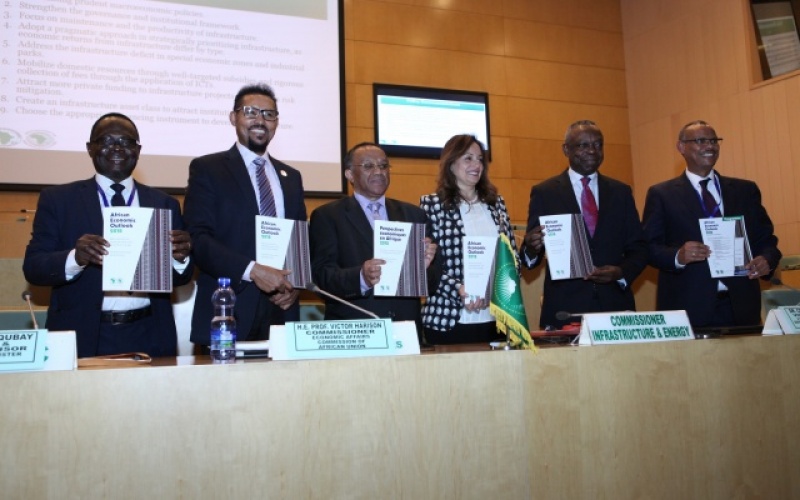
The African Economic Outlook – the African Development Bank’s flagship analysis of the state of African economies – was presented to key stakeholders on the sidelines of the ongoing 30th Ordinary Session of the Assembly of the Heads of State and Government of the African Union in Addis-Ababa on Friday, January 27th, 2018.
This official launch, a first in the Bank’s history to be launched in January of the publication year, provided a unique opportunity to strengthen the cooperation between the African Union and the AfDB in its continued efforts for Africa’s economic transformation. The Bank’s Chief Economist and Vice-President for Economic Governance and Knowledge Management, Célestin Monga, noted that the report was presented in January to give policy-makers enough time to reflect on the recommendations for economic planning and transformation.
The event was co-organised by the African Union’s Department of Economic Affairs and the AfDB in close collaboration with the Ministry of Finance and Economic Cooperation of Ethiopia and AUC’s Department of Infrastructure and Energy.
The ceremony was moderated by the Director of Economic Affairs Dr. Rene N’Guettia Kouassi with a panel composed of H.E. Prof. Victor Harison, Commissioner for Economic Affairs, Commission of the African Union; Dr. Celestin Monga, Chief Economist and Vice-President, Economic Governance & Knowledge Management; Dr. Abebe Shimeles, Acting Director, Macroeconomic Policy, Forecasting and Research; and Dr. Arkebe Oqubay, Minister and Special Advisor to the Prime Minister of Ethiopia who addressed a Keynote speech to guest and journalists present.
Addressing invitees from the African Union Commission Summit, local and international media, and global and regional development organisations, the Commissioner for Economic Affairs of the AUC, Prof. Victor Harrison, endorsed the report, urging African countries to adopt the recommendations for inclusive growth. “These studies present the behaviour of African economies in the face of difficult external conditions and announce the revival of growth with an estimated rate of 4.1 percent in 2018. We all know that growth is not yet inclusive in Africa, and unemployment affects more women and young people,” he told the audience.
Prof. Harrison urged member states to improve the business climate and stimulate the private sector to participate in the development.
On her part, Commissioner Amani Abou-Zeid, Commissioner for Infrastructure and Energy at the African Union Commission, described the report as highly relevant and useful for Governments and other stakeholders.
The African Economic Outlook puts average real Gross Domestic Product (GDP) growth in Africa at 3.6 percent in 2017 − a good recovery from the 2.2 percent recorded in 2016. The 2017 figure is projected to grow by 4.1 percent a year in 2018 and 2019.
Arkebe Oqubay, the Minister and Special Advisor to the Prime Minister of Ethiopia, congratulated the Bank for releasing the report in January, assuring that it would be useful for African leaders and for economic transformation. He appealed to African countries to drive high and sustained growth, which must be backed by structural changes, the domestic mobilization of resources, and targeted and selective infrastructure.
“African countries should design policies to help them create jobs. We need to focus on more permanent jobs and increased skills. We need to focus on quantity and quality,” Oqubay said.
Worth noting that, deepening the African Union and AfDB cooperation is key for strengthening economic research and economic policy-making for Africa’s transformation under the frameworks of Agenda2063 and the Hi5’s. This launch proved to show a step forward toward this achievable goal.
The African Economic Outlook is produced annually by the African Development Bank and provides short- to medium-term forecasts on the evolution of key macroeconomic indicators for all 54 regional member countries, as well as analysis on the state of socio-economic challenges and progress made in each country.
Source: AU

































